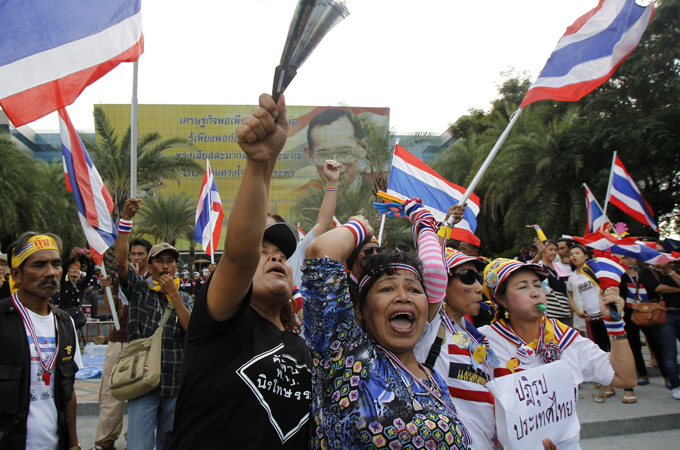Thai court rejects government's amendments |
Constitutional Court said moves to change Senate's composition were flawed, but did not dissolve the ruling party.
Last updated: 20 Nov 2013 20:23
|

Anti-government protesters shout slogans as they gathers outside the Constitutional Court in Bangkok [Reuters]
|
| Thailand's Constitutional Court has ruled that government efforts to amend the constitution were illegal, but stopped short of dissolving the ruling Phea Thai Party and its coalition lawmakers who supported the amendments. The court's ruling on Wednesday is a blow to Thai Prime Minister Yingluck Shinawatra, who intiated the amendments in an attempt to strengthen her party's legislative grip. The court ruled on 5 to 4 that the amendments violated the country's charter. Nearly half of the members of the Senate are appointed and the proposed changes involved scrapping appointed senators to create a larger, fully elected chamber. But the judges ruled that the proposal would have allowed family members of existing lawmakers to win seats. Yingluck's party dominates the elected lower house of parliament but has been unable to use its electoral strength to control the Senate fully. The decision is the latest setback for Yingluck's government after the Senate last week rejected an amnesty bill that critics say was designed to whitewash the crimes of her influential, self-exiled brother, former premier Thaksin Shinawatra, to clear him to return home. Security was tight outside the court where more than 200 protesters gathered to voice their disapproval of the ruling party. Many who watched the ruling as it was televised live nationally said they were disappointed that Phea Thai party members were not punished. "I'm a little disappointed. I understand that the amendment didn't pass, but to not punish the political party that brought it to court, I don't agree with that. So the blame falls on everyone, but I do respect the decision of the court," said 63-year old Sombat Sanchaudkrai. Protesters blew whistles and chanted for Prime Minister Yingluck Shinawatra to step down. Thaksin divisive The verdict could ease some tensions on the streets of Bangkok where thousands of demonstrators have gathered in recent weeks in an attempt to destabilise the government. Some analysts believe the amnesty and constitution amendment push, both seen as moves orchestrated by Thaksin to consolidate his power for years to come, could be used by both his allies and his enemies to advance their interests. Though the Senate rejected the amnesty, it did little to placate anti-government protesters. Their leader, Suthep Thaugsuban, a former opposition party heavyweight, last week told a 50,000-strong crowd to keep up the momentum and "uproot the Thaksin Shinawatra regime". Thaksin won two sweeping election victories but was ousted in a 2006 coup. He remains divisive, idolized by millions of urban and rural poor but reviled by the royalist establishment and members of the urban middle class who chafe at the prospect of his return to office. |

This blog contains lots of articles and world news. Its aim is to be a source of knowledge for people to read and think, and thus make an intuitive decision on how to lead their lives fruitfully in every-day livings.Under the concept of Today-Readers are Tomorrow Leaders.' The world will be better because we begin to change for the best.
วันพุธที่ 20 พฤศจิกายน พ.ศ. 2556
สมัครสมาชิก:
ส่งความคิดเห็น (Atom)
ไม่มีความคิดเห็น:
แสดงความคิดเห็น